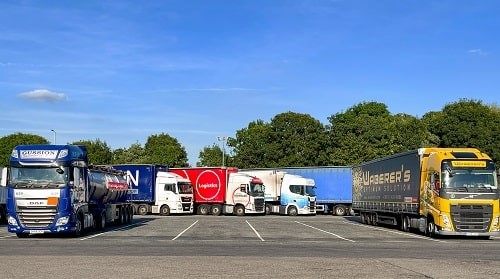Campaign groups have welcomed the UK Government’s announcement this week of a £16.5 million investment to upgrade facilities at 38 truck stops throughout England, but say there is more work to do to further improve working conditions for HGV drivers.
News
Campaigners applaud lorry driver facilities investment but call for further action
The Department for Transport (DfT) said on 4 March that it would invest, jointly with industry, £16.5 million in the provision of better rest areas, improved welfare facilities and more secure parking at 38 truck stops across England. The investment – £6 million of which will come from the DfT and £10.5 million from industry – will cover new showers and restaurants, better lighting and secure fencing around rest areas, as well as about 430 new HGV parking spaces.
 Joint Government and industry investment aims to improve HGV driver facilities in England. Photograph: iStock/Ceri Breeze
Joint Government and industry investment aims to improve HGV driver facilities in England. Photograph: iStock/Ceri Breeze
Samantha Bradley, a former HGV driver and haulage firm boss who helps run Truckers Toilets UK (TTUK), which campaigns to improve facilities and working conditions for lorry drivers, said the investment was “very welcome” and long overdue.
“Let’s face it, any investment in facilities for HGV drivers across the UK has to be welcomed. It’s something that has been left aside for too long,” Bradley told Safety Management. However, she voiced concerns that the upgrades would focus mainly on truck stops along major road networks and that more rural delivery locations could be “left behind”.
The 38 truck stops earmarked for investment include 15 Moto Hospitality-run motorway rest stops. Other winners include two truck stops along the M1 in Derbyshire, two along the A19 in County Durham, Ashford International Truckstop in Kent, Bardon Truck Park in Leicestershire and Immingham Lorry Park in Lincolnshire.
The Road Haulage Association (RHA) has also welcomed the investment announcement, describing it as a “major win” for the trade body’s driver facilities campaign.
“We are delighted to see the Government’s match-funded grant scheme being awarded to projects which will make a tangible difference to the experiences of lorry drivers and provide much-needed additional parking capacity to address the well-known shortage of spaces,” said the RHA’s director of policy and public affairs, Declan Pang. “We are pleased to see facilities operators contribute funding and commit to improving security and conditions at the sites they operate.”
Alongside its call for more government funding to improve the number of safe and secure driver facilities and parking spaces, the RHA is campaigning for planning policies to be simplified, to ensure new facilities can be built more quickly. The trade association also wants to see the introduction of a new freight crime category and the development of a minimum standard for truck stop security.
Bradley from TTUK also emphasised the importance of security: “There are more female drivers and security is paramount, for obvious reasons,” she said. “Also, there are lots of organised gangs, especially up the M1 corridor where diesel and loads are being pinched from some motorway rest areas. There are security cameras but there’s no physical barrier to stop them. If ANPR [automatic number plate recognition] was in place, it would be a lot better.”
Security concerns, particularly when parking overnight, were a key reason why Bradley stopped driving HGVs in the early 1990s. However, she said that improvements to driver facilities would “definitely encourage more women” to enter the profession today.


NEWS

India’s social security coverage doubles to almost 50 per cent, says ILO
By Orchie Bandyopadhyay on 08 April 2025
The proportion of India’s population covered under some form of cash paying social security protection has almost doubled in just three years, according to a new International Labour Organization (ILO) report.
Venue owners have two years to tighten up safety as Martyn’s Law passes Royal Assent
By on 01 January 0001

